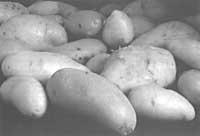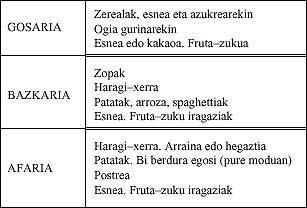What is hunger?
1990/05/01 Agirre, Jabier - Medikua eta OEEko kidea Iturria: Elhuyar aldizkaria
A natural example of our food needs, hunger, has deviated from its goals in our Western life. Today it is but a manifestation of social pressure, of our desires and neurosis. And that's why it has a lot of harmful consequences, being one of those weight gains (and not the worst). Therefore it is necessary not to learn to trust this feeling and not to accept its messages blindly.

The alternation of hunger and saturation is limited during the day by the presence or not of certain substances in the cells. However, the deficit or abuse of fat reserves can alter this alternation in the long term, in days or months. When we lose weight from illness, then we eat more spontaneously until we regain the usual weight. And vice versa, after the physiological weight gain, we eat less and weaken until we get our normal weight. If we skip a meal every day we recover it with the following. And normally after a large banquet we eat less the next day.
This can be tested experimentally in animals, using two rats (genetically identical, from the same breeding season). While the first batch is given a 10g meal, the second one eats without any limitation. Those in the first group faint at first, but less and less quickly the weight (and sometimes even rises) stabilizes. Then its ascending curve is statistically equal to that of those who eat normally. But when given the same ration as others, their weight increases enormously, as if their diet was more efficient this time around.
The same happens in our slimming sessions, at least in the long term. Rapid weight loss in the first few days is quickly stabilized. And food for a long time
if maintained (up to 600 calories) is ineffective. And this leads to despair and it is easy to understand the failures suffered in long slimming processes.
The body reduces its energy expenditure to adapt to this shortage. We move less to save energy. At the same time, basic metabolism decreases: cardiac and respiratory work (and thus all consumption) is lower, without any intervention of our will.
At first glance, one may think that the less one eats the more hunger there will be. But that doesn't happen, much less. Some obese who have started eating with a drastic reduction say that after a few days they do not feel hungry. For others, however, lack is unsustainable; they are always hunger. There is therefore no single level for this need.

Hunger is a natural need to eat. It is not a special feeling of food. And how does it appear? With a “cow” sitting around the stomach (hence I have a hole in my stomach). Often nervousness, restlessness, anxiety, etc. can also appear (but not always). But it is also indicative of a metabolic situation: hypoglycemia (decreases the blood sugar level). However, in most cases, and especially when the diet is normal and balanced, hunger is usually without a real hypoglycemia.
Appetite or appetite is something special about a particular food. It appears in the aid of hunger to delay the state of saturation. It affects the volume of food and not the need, but the pleasure. However, it is very difficult to distinguish between hunger and appetite, and they are often confused. For a long time it has been thought that the mechanism of hunger started in the iron pipe and ended in it. Therefore, the empty stomach pushed to eat and stop eating full stomachs. But the issue is much more complex. There are different stimuli, external and internal, whose actions intertwine reaching through neurons to the center of hunger located in the brain.
Light hypoglycemia is normal in the middle of the morning, but the glycogen in reserve in the liver is automatically released into the blood to convert it back into glucose (thus disappearing this feeling of hunger). But when hunger is associated with stress it can also be painful. Hunger, on the other hand, is very fleeting (it begins to lower when you eat), and yet food has not had time to be absorbed in the intestine and correct the caloric deficit. Even less so in healthy people, who have enough reserves to endure several days (glycogens and fats).
Like sight, the smell (or simple memory) of a meal produces salivation, always related to hunger. Also with appetite, it takes over in the development of food. Saturation should then appear (and our food balance depends on it faster and slower).
Satisfaction is not the same for all people. Here a lot of factors are generated. Although it is important to have a full stomach, it is not mandatory. Food variability stimulates appetite. However, boredom causes saturation to arrive earlier. The quality of food also influences, and the better a food is the more it is eaten and the harder it is to leave it.

Another factor is taste. We will eat more and easier than we like. Pastry makers and gourmets will be reopened their appetite by seeing the sweet, while those who prefer salty will feel the feeling of satiety before the same desserts. Food emotion is therefore important in the phenomenon of saturation.
But sensations change throughout the meal. What at first was very pleasant, will be less and less. This phenomenon depends on the caloric density of food. Thus, fats, by providing many calories with a small volume, satiate much faster. As for proteins and sugar, there are nerve cells in the duodenum that are special receptors of amino acids and glucose. Once these substances are collected, the cells will send their message to the brain as a sign that amino acids or glucose have reached their destination.
There are therefore external signs (vision, smell, taste and temperature), internal (empty stomach or blood sugar level) and mental (rhythm of meals) that produce the hunger signal. On the other hand, saturation of the stomach, fat, protein, sugar and habit ignite the satiety signal. But we must also take into account our desires or desires, our feelings, our tranquility or anxiety. We all know people who are affected by a specific situation, while others are prevented from appetite. That is why the problem is difficult to measure. The difference between these signals and how to master them (or not master them) can lead to disorder and weight gain in the world of food.
But is it possible to master and control our appetite and appetite? For some, mastering and selecting these signals is not so difficult. For them there is no problem. For others, however, this issue is the daily struggle. They do not stop violating their will: ignore the sign of hunger, but when the sign of satiety appears, the ears jump! And you, reader, what kind?
Organize hunger
- Make a balanced meal three times a day at certain times with the presence of proteins, lipids and carbohydrates. This is the best and safest way to maintain a normal hunger.
- If the normal time of eating is delayed, a large forest will be deceived by contractions of the stomach.
- We eat animal proteins (meat, fish, eggs, dairy) in all meals. They are very rich in tryptophans, precursors of serotonin. And serotonin produces saturation.
- We consume foods rich in carbohydrates (bread, starches, cereals). For serotonin and also to rule out the risk of hypoglycemia.
- Rule out that sugar or sweet foods are fasting or between meals to prevent insulin runoff that produces a huge appetite.
- The diet rich in fibers fills the stomach and hinders the absorption of other nutrients.
- Remove exciting signals. Therefore, at noon or in the afternoon it would be better to stay before a bookstore than before a supermarket or a pastry shop.




